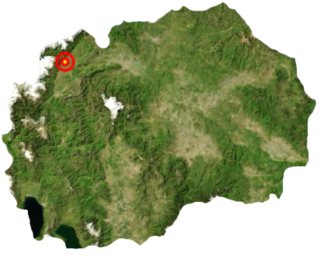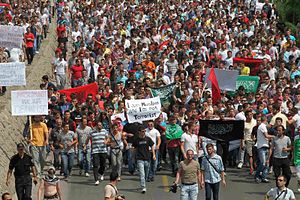
The National Liberation Army, also known as the Macedonian UÇK was an ethnic Albanian militant and separatist militia that operated in the Republic of Macedonia in 2001 and was closely associated with the Kosovo Liberation Army (KLA). Following the 2001 insurgency in Macedonia, it was disarmed through the Ohrid Framework Agreement, which gave greater rights and autonomy to the state's Macedonian Albanians.

Tetovo is a city in the northwestern part of North Macedonia, built on the foothills of Šar Mountain and divided by the Pena River. The municipality of Tetovo covers an area of 1,080 km2 (417 sq mi) at 468 meters (1,535 ft) above sea level, with a population of 63,176. The city of Tetovo is the seat of Tetovo Municipality.
The Albanians in North Macedonia are the second largest ethnic group in North Macedonia, forming 446,245 individuals or 24.3% of the resident population. Of the 2,097,319 total population in the 2021 census, 619,187 or 29.52% are Albanians.

Nikola Gruevski is a former Macedonian politician who served as Prime Minister of Macedonia from 2006 until his resignation, which was caused by the 2016 Macedonian protests, and led the VMRO-DPMNE party from 2004 to 2017.

The 2001 insurgency in Macedonia was an armed conflict which began when the ethnic Albanian National Liberation Army (NLA) insurgent group, formed from veterans of the Kosovo War and Insurgency in the Preševo Valley, attacked Macedonian security forces at the end of January 2001, and ended with the Ohrid Agreement, signed on 13 August of that same year. There were also claims that the NLA ultimately wished to see Albanian-majority areas secede from the country, though high-ranking members of the group have denied this. The conflict lasted throughout most of the year, although overall casualties remained limited to several dozen individuals on either side, according to sources from both sides of the conflict. With it, the Yugoslav Wars had reached Macedonia. The Socialist Republic of Macedonia had achieved peaceful independence from Yugoslavia in 1991.

Turks in North Macedonia, also known as Turkish Macedonians and Macedonian Turks, are the ethnic Turks who constitute the third largest ethnic group in the Republic of North Macedonia. According to the 2002 census, there were 77,959 Turks living in the country, forming a minority of some 3.8% of the population. The community forms a majority in Centar Župa and Plasnica.

The Albanian National Army, is an Albanian paramilitary organization which operates in North Macedonia, Serbia and Kosovo. The group opposes the Ohrid Framework Agreement which ended the 2001 insurgency in Macedonia between members of the National Liberation Army and Macedonian security forces.

The Battle of Tetovo, was the largest engagement during the 2001 insurgency in the Republic of Macedonia, in which Macedonian security forces battled the National Liberation Army (NLA) for control of the city.
Mehmet Gega was a teacher and an Albanian rights activist. He was born and raised from a noble family, one of the few traditional tetovarian families with old roots. Since he was a young boy, he had a revolutionary spirit and directly recognized the injustices and systematic terror exerted by the Yugoslav gendarmerie in these lands. As a young man, he was noted for his ingenuity, courage, and willingness to resist the violence exercised by the monarchic powers of that time. He was therefore arrested for the first time in 1939.
The 100th Anniversary of the Independence of Albania was a yearlong celebration in 2012 when Albanians celebrated the 100th anniversary of establishing independent Albania, the first Albanian state in modern history.
The Smilkovci Lake killings also called the Smilkovci Lake massacre was the killing of five ethnic Macedonian civilians that took place on 12 April 2012. They were shot and killed at a man-made lake near the village of Smilkovci, outside the Macedonian capital Skopje.

Operation Mountain Storm was carried out on 7 November 2007 by special police forces of the Republic of Macedonia against an armed ethnic Albanian group in the Šar Mountains of Brodec above Tetovo region with ties to Albanian paramilitary of the conflicts in Kosovo (1998–1999), Preševo Valley (2000–2001) and Macedonia (2001).

The 2015 Kumanovo clashes, also known as Operation Divo naselje, were a series shootouts which erupted during a raid between the Macedonian police and an armed group identifying itself as the National Liberation Army (NLA). They began on 9 May 2015 in the northern Macedonian town of Kumanovo. During the shootings, eight Macedonian policemen and 14 of the militants were killed, while 37 officers were wounded and hospitalized. The shooting ended on 10 May 2015, in an operation by the Macedonian police and armed forces, in which 30 militants were arrested and charged with terrorism-related charges by the Macedonian authorities.

In April 2016, protests began in the Republic of Macedonia against the incumbent President Gjorge Ivanov and the government led by the interim Prime Minister Emil Dimitriev from the ruling VMRO-DPMNE party. Referred to by some as the Colorful Revolution, the protests started after the controversial decision by President Gjorge Ivanov to stop the investigation of former Prime Minister Nikola Gruevski and dozens of politicians who were allegedly involved in a wiretapping scandal. The demonstrations were organized by "Protestiram" and supported by a coalition led by the Social Democratic Union of Macedonia and other opposition parties, in addition to the newly formed Levica demanding that the government resign and be replaced by a transitional government and that the parliamentary elections planned for 5 June 2016 be cancelled, on the grounds that the conditions for free and transparent elections were not in place. The government and its supporters, who had organized pro-government rallies, maintained that the elections on June 5 were the only solution to the political crisis, with some observers blaming the opposition for creating a "Ukraine scenario" in Macedonia.
Albanian nationalism in North Macedonia traces its roots in the wider Albanian nationalist movement which emerged as a response to the Eastern Crisis (1878) and proposed partitioning of Ottoman Albanian inhabited lands in the Balkans among neighbouring countries. During the remainder of the late Ottoman period various disagreements culminated between Albanian nationalists and the Ottoman Empire over socio-cultural rights. The Balkan Wars (1912–13) ending with Ottoman defeat, Serbian and later Yugoslav sovereignty over the area generated an Albanian nationalism that has become distinct to North Macedonia stressing Albanian language, culture and identity within the context of state and sociopolitical rights. Pan-Albanian sentiments are also present and historically have been achieved only once when western Macedonia was united by Italian Axis forces to their protectorate of Albania during the Second World War.
Ballistet are ultra supporters of the KF Shkëndija football club in Tetovo, North Macedonia. They were officially established as the main ultras group for Shkëndija in 1992.

The Karpalak ambush, referred to by Macedonians as the Karpalak massacre, was an attack carried out by the National Liberation Army (NLA) against a convoy of the Army of the Republic of Macedonia (ARM) near the village of Grupčin on 8 August 2001 during the 2001 insurgency in Macedonia. Ten members of the ARM's Military Reserve Force, including two officers, were killed at Karpalak and three others were wounded. The ambush was the single deadliest incident of the conflict. It was speculated that the ambush was carried out in retaliation for a Macedonian police raid in Skopje, the day before in which five NLA insurgents were killed.
Bit Pazar shooting or Bit Pazar incident took place on 6 November 1992. At the time, it was an event that weakened the stability of Macedonia and raised the possibility of an outbreak of armed conflict between ethnic Albanians and Macedonians in the country.
During the 2001 insurgency in Macedonia, a raid was conducted by the Macedonian police against ethnic Albanian rebels in a suburb of Skopje on 7 August. The police killed the rebel group and captured their weapon supplies.












